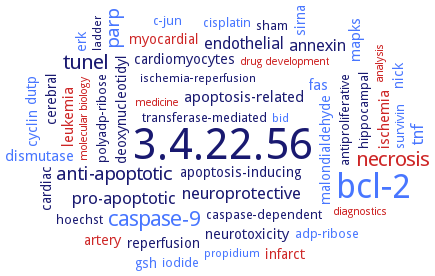3.4.22.56: caspase-3
This is an abbreviated version!
For detailed information about caspase-3, go to the full flat file.

Word Map on EC 3.4.22.56 
-
3.4.22.56
-
bcl-2
-
caspase-9
-
necrosis
-
tunel
-
parp
-
anti-apoptotic
-
neuroprotective
-
pro-apoptotic
-
tnf
-
endothelial
-
annexin
-
leukemia
-
apoptosis-related
-
mapks
-
fas
-
ischemia
-
dismutase
-
deoxynucleotidyl
-
erk
-
neurotoxicity
-
artery
-
cyclin
-
cerebral
-
dutp
-
malondialdehyde
-
reperfusion
-
infarct
-
nick
-
cardiac
-
sirna
-
apoptosis-inducing
-
myocardial
-
gsh
-
cardiomyocytes
-
sham
-
c-jun
-
cisplatin
-
survivin
-
transferase-mediated
-
iodide
-
hippocampal
-
adp-ribose
-
hoechst
-
antiproliferative
-
caspase-dependent
-
polyadp-ribose
-
bid
-
ischemia-reperfusion
-
propidium
-
ladder
-
analysis
-
drug development
-
molecular biology
-
medicine
-
diagnostics
- 3.4.22.56
- bcl-2
- caspase-9
- necrosis
-
tunel
- parp
-
anti-apoptotic
-
neuroprotective
-
pro-apoptotic
- tnf
- endothelial
-
annexin
- leukemia
-
apoptosis-related
- mapks
- fas
- ischemia
- dismutase
-
deoxynucleotidyl
- erk
-
neurotoxicity
- artery
- cyclin
- cerebral
- dutp
- malondialdehyde
-
reperfusion
- infarct
- nick
- cardiac
- sirna
-
apoptosis-inducing
- myocardial
- gsh
- cardiomyocytes
-
sham
- c-jun
- cisplatin
- survivin
-
transferase-mediated
- iodide
- hippocampal
- adp-ribose
-
hoechst
-
antiproliferative
-
caspase-dependent
-
polyadp-ribose
- bid
-
ischemia-reperfusion
- propidium
-
ladder
- analysis
- drug development
- molecular biology
- medicine
- diagnostics
Reaction
strict requirement for an Asp residue at positions P1 and P4. It has a preferred cleavage sequence of Asp-Xaa-Xaa-Asp-/- with a hydrophobic amino-acid residue at P2 and a hydrophilic amino-acid residue at P3, although Val or Ala are also accepted at this position =
Synonyms
apopain, C14.003, Cas-3, CASP-3, CASP3, caspase 3, caspase-3, CgCaspase-3, CPP-32, CPP32, CPP32/apopain, cystein aspartic-specific protease-3, cysteine aspartic acid-specific protease, cysteine protease CPP32, DEVDase, IRP, Lyccasp3, Mncaspase-3c, More, SBTc-3, SCA-1, SREBP cleavage activity 1, Yama protein, Yama/CPP32, ZCASP3
ECTree
Advanced search results
Engineering
Engineering on EC 3.4.22.56 - caspase-3
Please wait a moment until all data is loaded. This message will disappear when all data is loaded.
C143A
-
inactive enzyme. Catalytically inactive p17 polypeptide is expressed in a stable manner, while wild-type p17 is rapidly degraded
D179A
increase both in kcat- and KM-value. D179 is involved in substrate recognition
R64E
-
site-directed mutagenesis, the mutant existed in the nuclear fraction, the subcellular localization signal in the rev-caspase-3 is not disrupted by the R64E mutation
C163G
-
transfection of human breast cancer cells lacking enzyme with wild-type or mutant cDNA. Expression of wild-type, but not the inactive mutants C163G or C163S, is associated with increased enzyme activity and susceptibility to staurosporine-induced apoptosis. Wild-type and mutant transfection results in inhibition of cell growth and decrease in phosphorylation of the Akt protein compared to control
C163S
-
transfection of human breast cancer cells lacking enzyme with wild-type or mutant cDNA. Expression of wild-type, but not the inactive mutants C163G or C163S, is associated with increased enzyme activity and susceptibility to staurosporine-induced apoptosis. Wild-type and mutant transfection results in inhibition of cell growth and decrease in phosphorylation of the Akt protein compared to control
additional information
-
engineering of CHO cells for more robust cell lines includes reduction of apoptotic capase-3, activities in different mutant cell lines, overview. The cells exhibit a reduction in caspase 3 activity of at least 60% and a 170% enhancement in mitochondrial membrane potential compared to controls when treated with staurosporine
additional information
-
caspase-3 gene silencing leads to inhibition of apoptosis in insulinoma cells and human islets, caspase-3 upregulation leads to the generation of active caspase-6 and caspase-7, which in turn degrade a number of intracellular protein substrates
additional information
-
construction of an in vivo mouse hind limb H460 lung cancer model
additional information
caspase-3 knockout by shRNA, generation of double knockdown cells lacking caspase-3 and caspase-7, EC 3.4.22.60, activity. Generation of caspase-7-based chimeric constructs with various regions of caspase-3, EC 3.4.22.56
additional information
-
caspase-3 knockout by shRNA, generation of double knockdown cells lacking caspase-3 and caspase-7, EC 3.4.22.60, activity. Generation of caspase-7-based chimeric constructs with various regions of caspase-3, EC 3.4.22.56
additional information
engineering of a light-activated human caspase-3 (Caspase-LOV) by exploiting its natural spring-loaded activation mechanism through rational insertion of the light-sensitive LOV2 domain that expands upon illumination
additional information
-
engineering of a light-activated human caspase-3 (Caspase-LOV) by exploiting its natural spring-loaded activation mechanism through rational insertion of the light-sensitive LOV2 domain that expands upon illumination
additional information
-
construction of a caspase-3/-7 double-knockout mouse embryonic fibroblasts cell model for studying of autophagy contributing to the mechanism of increased cell death, following inhibition of apoptosis


 results (
results ( results (
results ( top
top






